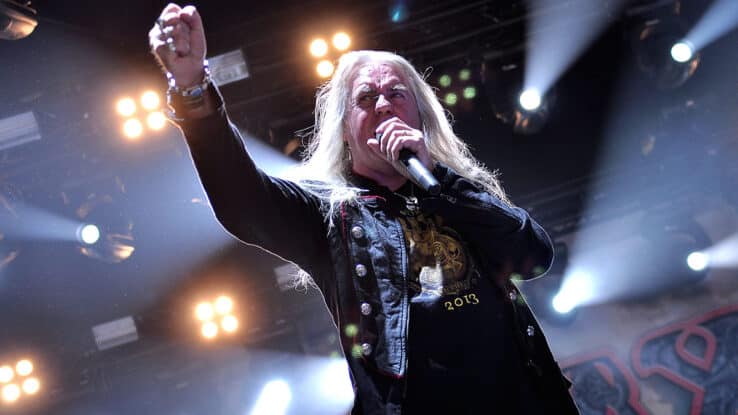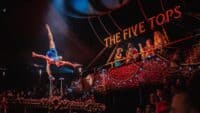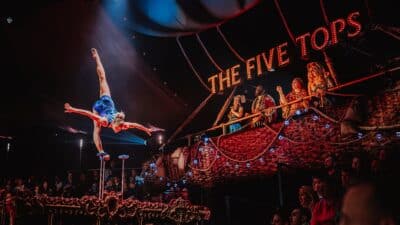Interview

Interview
My Greatest Hits: Biff Byford of Saxon
The Saxon frontman picks his career highlights, from performing at the inaugural Monsters Of Rock festival to collaborating with Elton John
If you ask most bands what their ultimate goal is, there’s a fair chance the answer will surprise you.
For many musicians, the real marker of success is a little less glamorous than sold-out stadium tours and shelves filled with various awards – it’s about longevity. To not only still be performing decades after their formation, but to still be growing, inspiring new generations to follow the same path they started upon as kids with a dream.
It’s a hope that most bands have, yet few manage to truly realise, and over the last 50 years Saxon have forged a success story like no other. Playing a distinct role in the creation of the New Wave of British Heavy Metal, since breaking onto the scene with their genre-defining 1980 album Wheels Of Steel, the Yorkshiremen have boasted an imitable blend of bombastic power and thunderous riffs.
Often utilising their songs as a vessel to explore history, mystery, and the magic of rock ’n’ roll, their belting 24th studio album Hell, Fire And Damnation arrived in 2024 to huge acclaim. The latest chapter in a journey that has seen frontman Biff Byford and his bandmates conquer stages across the globe, the metal icons are celebrating with the Hell, Fire And Steel tour, playing their groundbreaking Wheels Of Steel album in full alongside fan-favourite tracks from throughout their sprawling career.
Marking over 45 years of Saxon with a night of heavy metal glory set to hit venues across the UK, we sat down with Byford to talk through some of his career highlights, from accidental St. George’s Day traditions to getting Brian Blessed to introduce their latest album.

Playing with Motörhead on the Bomber tour
“When our first album came out it did okay, but it didn’t set the world on fire. For our second album, the record company was looking for tours that they could put us on to support it. The album was coming out in 1980, and the Bomber tour was in late 1979, so it was a perfect fit. There were a few other tours suggested – such as UFO and Thin Lizzy – and although we loved those bands, we felt that our band was a little bit different. We were playing more aggressive music than they were, so we thought we suited the Motörhead audience better. It worked out well for us, because the Bomber tour was massively successful. It sold out everywhere for multiple nights, and Motörhead were about as big as they could get at that point. They were doing Top Of The Pops and radio, so we were lucky with that tour. A lot of larger bands were looking to tour with someone like Motörhead during that period, but we had a little bit of a kindred spirit with them due to our working class, anti-establishment rebellion. As that tour ended, we jumped straight onto the Nazareth tour, and that’s when it really started to change for us.”
What was it like to spend time with Lemmy and the band at that point in their career?
“We were real friends with them. They loved us, and they came to see us when we started headlining shows. We struck up a great friendship that lasted right up until their deaths, and we’ve toured with all the Motörhead line-ups throughout the years. We had a special relationship with the band, their management, and their team, and everything was friendly. There was always a bit of competition between bands, but there was no pressure. I remember that Lemmy would always check out how big the sofas were in the dressing rooms, as he wanted the bigger sofas. We always tried to get the biggest one, and there was a whole lot of piss-taking when we were together.”
Performing at the inaugural Monsters Of Rock festival
“It was all a bit crazy, because we were the underdogs. I don’t think anybody had really heard of us, especially the other bands, because we hadn’t been around for long. When we got onstage though, the audience definitely knew us. We’d sold a lot of copies of Wheels Of Steel by then, even though we were still the new guys on the block. We were incredibly nervous, because we were so aware that we could blow it. We had thirty minutes to play, and it was probably the most important thirty minutes we’d had at that time. We were going onstage before all of these great bands, so the pressure was real, but it turned out amazing.”
The song ‘And The Bands Played On’ was inspired by that time too…
“It represents that fantastic time in the ‘80s where a whole generation of fans new and old came together for this one genre. From Rainbow and Scorpions to Judas Priest and Saxon, it was a fantastic time to come together and build the genre. It was moving for all the bands, because there were 70,000 people at a one-day, no camping festival. Everybody travelled there on the day and left in the evening, which meant the audience was as dedicated to the cause as we were.”
Working on Wheels Of Steel
“We only had a two-album record deal, so the label was going to drop us. Our debut album had a bit of a mismatch of styles, so the second one had to be really focused. The A&R guy told us to get into the studio together and nail it, so we went to The Who’s studio in Battersea. It was a great feeling to work in Pete Townshend’s studio anyway, but all the planets were in line for that album. We made it very quickly, and you can tell when you listen to the songs because it’s quite aggressive. There’s a lot of passion in there, but we didn’t know that it was going to be a hit. I think that being in a band is like playing the lottery in that sense. You’re just hoping for that one hit to make you a little bit more special, and a little bit more interesting than your peers. We were very lucky with that record.”
The band’s St. George’s Day show tradition
“We’re very proud to be British, and English. We come from a working-class background, and we’ve always had that ‘never surrender’, stand up and be counted mentality. That’s our motto and our coat of arms, and with that you feel like a part of a big movement. Truthfully though, the first St. George’s Day show was an accident. We just happened to be playing on that day, so we turned it into a St. George’s Day gig. Our manager in the ‘90s was German though, and he liked the idea of doing a gig every year on St George’s Day. The Irish, Welsh, and the Scottish have their day each year, but England doesn’t bother too much. I think we’re a bit scared of the flag and the connotations of it. We did it though, and it was really successful. We try to play songs like ‘Crusader’ and the medieval historic songs a little more at those shows.”
Collaborating with Elton John
“It’s still a big talking point when it comes to Saxon, because people are stunned that it happened. We spent two months in the studio together though. We were in one studio, they were in the other, and we’d have all the food brought in at night to eat together. We became mates, so we asked Elton if he would play on a track for a bit of fun. The track that we chose was called ‘Party Til you Puke’, which we wrote about the parties we had there with his band. I don’t think Elton was there getting drunk every night, but we were, and his band definitely were. A lot of our hardcore fans didn’t really understand why we had him on the track, but it was just a bit of fun. Mates playing on each other’s albums, like it should be.”
Saxon’s set at Wacken Open Air in 2009
“We’ve always had a special relationship with Wacken because we’ve always had a special relationship with Germany. It was the third place that really got Saxon, after the UK and Sweden. Germany came in strong when Wheels Of Steel was released, so we have a lot of fans there, both young and old. We have a long history with Wacken, and it’s always special to play there. The 2009 festival was a particularly special moment for us because we headlined the big stage. It’s interesting because the idea of metal festivals started in the UK, but Wacken is almost like the metal version of Glastonbury. People come from all over the world to visit, and it’s a great place. It’s still more or less family run, and it’s a brilliant pilgrimage. It’s predominantly a metal festival, but other bands can play too. The crowd are open to anything, as long as there are great songs that they can sing along to. They just want to have fun.”
Touring with Judas Priest in 2024
“It was great for both bands, because I don’t think either of us could have filled those venues on our own. We have a massive respect for Judas Priest because they’ve been around for even longer than us, and they did all the groundwork for bands like Saxon and Iron Maiden to come in. Their songwriting is brilliant. They don’t write things that they think other people will like; they just write things that they like. I think that’s the key to success, and it was great for both bands to be there to celebrate our journeys. I think Judas Priest and Saxon are the ultimate package, and having Uriah Heep on the shows was icing on the cake. We took our music into arenas around the UK, and it was massively successful. I wish I could have seen the concert from the crowd’s perspective, because it must have been incredible. I think all three bands should be very proud of themselves.”
Celebrating the band’s 40-year anniversary in Hammersmith
“It got postponed so many times during COVID, but around 5,000 people kept their tickets throughout, which we were really humbled by. In the end, that show was two years in the making, so it ended up feeling very special. It was a big production, and we don’t usually use that production in the UK. The audience was amazing, the bands before us were brilliant, and it was a really great night. To headline Hammersmith again after so long… That was quite an emotional thing.”
How does it feel to know that Saxon fans are now bringing their kids and grandkids to see your shows?
“I think it’s testament to how we’ve adapted to the modern streaming setup these days. It’s all changed, and we’ve adapted over the years to use social media, produce vinyl, and make more videos. It’s about engaging the audience on a one-to-one basis, and that’s the key to the band’s success. If new people want to get into the genre, bands like Saxon are there to accommodate. We keep writing albums, and we keep trying to make great music. People respect us for doing that, and we don’t just sit down and write songs because we have to. We try to make every album as good as the last album, and we always have a lot to live up to. We have a massive legacy, so we’re not going to throw it away by putting out songs we’re not proud of.”
Collaborating with my son Seb on Heavy Water
“It was brilliant to work with Seb, and he’s a great songwriter who writes in all different styles. Even though he’s been brought up in a metal family, his first musical love was R&B, but he also loves Soundgarden and bands like that. We decided to write some songs together for a project, and most of the guitar stuff on the Heavy Water albums is his. He came up with the riffs, and then we came up with the melodies and some of the arrangements together. He’s really influenced by San Francisco and the Flower Power era, and I remember that time. Seb’s in his twenties, so he’s only getting it from books and the records that he listens to. I’ve never really spoken to him about it, so he’s picked that up on his own. It was almost like a meeting of minds, and the lyrics of Dreams Of Yesterday come from not only my memories of those days, but his feelings about it. I think the two Heavy Water albums are underrated, and I hope that one day they’ll be discovered and get the hits that they deserve.”
Working on Hell, Fire And Damnation
“When Paul [Quinn, founding guitarist] said that he was going to retire, my first thought was Brian Tatler. We’d toured with him before, he’s all about the music, and we knew he was a good guy. When we asked him to join, I don’t think we really intended to do any new music together. One day though, I asked him if he had any song ideas. He sent me around forty different ideas, and out of those forty ideas, I picked three. One of those was ‘Hell, Fire And Damnation’, one was ‘Madame Guillotine’, and one was ‘1066’. They were just guitar-based bits of music at the time, but they really spoke to me. Brian ended up being part of the songwriting for the album, which meant he was officially a part of the band. It was great to go on tour like that, and the album was so well-received. It felt like perfect timing, and Brian is finally getting a chance to headline these big stages.”
How did you come to get Brian Blessed to feature on the album’s opening track?
“I wanted something similar to The Number Of The Beast and the early stuff that Iron Maiden did… Lots of bands in the ‘70s had these big beginnings to their records. Brian is from Yorkshire, which is our part of the world, so we’ve met him a couple of times. We used to do a couple of things for miners’ charities, and he was always involved in that. We’ve certainly crossed paths, and he introduced us at Bloodstock one year. I asked him if he’d like to do an intro for us, and he said yes. He sent me about ten different versions of the intro, and it sounds fantastic. Everything on that album came together in a perfect storm, and now we have to write a new one that’s even better.”
Saxon bring their Hell, Fire and Steel Tour to UK stages this November. Find tickets here

Photo credit: Didier Messens / Contributor









